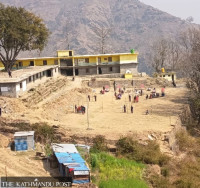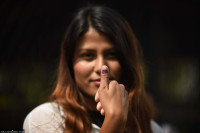National
Press Council’s censure of social media posts draws condemnation
This is beyond the council’s jurisdiction and it is part of a wider attempt of the Oli administration to muzzle freedom of expression, observers say.
Tika R Pradhan
On Thursday, Press Council Nepal issued a statement saying that it had cautioned a journalist and drawn the attention of a communication expert for their posts on social media.
But critics were quick to point out that Press Council Nepal, as a statutory autonomous body promoting the standards of a free press, does not have the authority to monitor the contents of social media.
“Has the existing Press Council Act been amended? Which clause of the Act allows the council to monitor social media?” asked Rajendra Dahal, former chairperson of the Press Council Nepal. “Even if anyone commits crime through social media, there are other laws like cyber law to punish them.”
Clause 8 of the Press Council Act-1992 talks about the function, duties and power of the council but it focuses on newspapers and gives the council the authority to carry out inquiries into anti-social and objectionable items published in them, though the code of conduct for journalists based on the Act was amended in 2019, incorporating issues related to online portals.
In its statement, the council also said that it has written to Nepal Telecom Authority to block 15 more news portals as per the Online Media Operation Directives since they had not been registered.
However, the provisions of the directives have been challenged at the Supreme Court.
“Since the provisions of the Online Media Operation Directives contravene the constitution, we have challenged it at the Supreme Court but it has been pending for a long time,” said advocate Baburam Aryal, one of the petitioners against the directives.
It is not just the Online Media Operation Directives that has faced criticism but also other attempts of the KP Sharma Oli government to curtail free speech.
To widen the limitations of the existing Press Council Act-1992, a new Media Council Bill was introduced in the Upper House in May 2019 to incorporate broadcast and online media as well.
But it was put on hold after widespread criticism, including from lawmakers of the ruling party, of the sweeping authority it gives to the council, which could increase direct attacks on free press.
Media experts believe that since the government could not implement the provisions of the Media Council Bill, it has been trying to muzzle freedom of expression by sending its supporters to the council.
“Sending party’s cadres in the quasi-judicial body government seems to terrorise media and individuals,” said Yubaraj Ghimire, an editor and a media expert. “The Press Council is going beyond its jurisdiction with malafide intentions.”
According to the Press Council Act 1992, the objectives of the council are to: create appropriate atmosphere for the development of healthy journalism, prescribe the code of conduct for journalism with a view to prohibiting the misuse of the freedom of press; maintain cordial relations between the press and Government of Nepal; maintain public morality and dignity of the citizens; and make continuous efforts to prohibit the interference with the decencies of the freedom of press and journalism.
Besides the Media Council Bill, the government had also prepared a Mass Media Bill to incorporate different media like print, radio and television and replace existing laws like the Press and Publication Act, Working Journalists Act and National Broadcasting Act. It has proposed a fine up to Rs10 million and jail term up to three years for violating its provisions.
However, the bill has not yet been tabled in Parliament.
The government's Information Technology Bill, presented in the now dissolved Parliament, also has sweeping powers to the authorities to block social media platforms if they are not registered in Nepal.
Experts have expressed concerns that the bill could curtail freedom of speech online and increase surveillance of personal data.
But in the current absence of stricter laws it wants to impose, the government has at its disposal the Press Council Act-1992.
The existing Press Council law can ask for clarification, apology and blacklist certain press organisations.
Experts, however, say that social media posts are related to individual freedom of citizens and the Press Council cannot even think of monitoring them.
“The council cannot even think of monitoring social media content of a citizen let alone issuing warnings,” said Aryal, who specialises in cyber law.
The council, according to its statement, issued a caution to Rojan Rai, a journalist associated with Sarokar Television, for posting on his Facebook page a photo of Prime Minister KP Sharma Oli, his press advisor Surya Thapa and media expert Ram Sharan Bajagain with a comment about their masks: “I see there are other places for the mask to cover, but I continued to cover my nose and mouth.”
Similarly, the council has stated that it has drawn the attention of Bhanubhakta Acharya, who is currently in Canada as a media researcher, for sharing a cartoon, originally published in thahakhabar.com, with the comment: Comrade ‘Badal’ Kumari.
Acharya said that the Press Council is trying to control the freedom of expression guaranteed by the constitution.
“It’s an attempt to control individuals from exercising their constitutional right to freedom of expression,” he told the Post via Facebook messenger. “Actually, the Press Council of Nepal has gone out of its way and become a tool for the government to control the media.”
However, Deepak Khanal, spokesperson of the Press Council, claimed that they have issued the caution just to journalists and those related to media as per the provision of the amended journalists’ code of conduct which talks about their social media posts.
“There is nothing to worry about our statement because we have only sought suggestions from the communication expert,” said Khanal. “The council had been cautioning journalists earlier too as per the provision in the journalists’ code of conduct.”
But other observers say that the latest incident is yet another example of the government’s high-handedness.
Bipul Pokhrel, chairperson of the Federation of Nepali Journalist and ex-officio member of the Press Council, called the decision to issue the statement irresponsible.
He said was not aware of the council’s decision to issue a statement as it was taken by a sub-committee related to monitoring code-of-conduct.
“How can the council monitor the social media posts of individuals?” Pokhrel told the Post. “It’s beyond the jurisdiction of the council and it is irresponsible.”
He said the council should be limited to its jurisdiction and the federation would come up with its statement regarding the decision soon.
According to Taranath Dahal, executive chief of Freedom Forum, a civil liberties organisation, the government is trying to build a narrative favouring its interests by censoring social media posts.
“The council has not only gone beyond its jurisdiction but also become a tool of the government to create a single narrative where criticism has no space,” he told the Post.
Even provincial governments have started to follow the attempts of the Oli administration to control the media.
On June 7, a bill on media was registered at the Lumbini Provincial Assembly with a number of provisions which are aimed to muzzle press freedom and right to expression.
The draft of the proposed bill gives sweeping authority to the press registrar of the province to block registration and renewal of the media and punish them for violating its provisions, including the need to register all media including online portals at the Province even if they have already been registered at the centre. The bill has proposed that the provincial government can annul the registration of the media, block content and jail an individual for up to one year.
“There are some serious provisions in the proposed bill that could muzzle the press freedom and freedom of expression including unnecessary punishment and annulment of licence,” said Pokhrel, chairperson of the Federation of Nepali Journalists. “The provision of a Media Council under the leadership of a provincial minister is also unacceptable.”
The Federation of Nepali Journalists has already demanded that the provincial government led by Shankar Pokhrel, a close aide of Prime Minister Oli, withdraw the bill.
Lumbini’s Minister for Internal Affairs and Law Chet Narayan Acharya, however, claimed that there was nothing to worry about as the bill was drafted on the basis of federal laws. But he could not name a single law it is based on .
Observers see this as a wider trend to silence criticism of the government.
“Oli administration’s series of legal provisions aiming to curb press freedom and freedom of expression shows that the government is hell-bent in its intention to control the media including social media wherever possible so as to silence the criticism against the government,” said Ghimire, the editor.




 27.41°C Kathmandu
27.41°C Kathmandu














